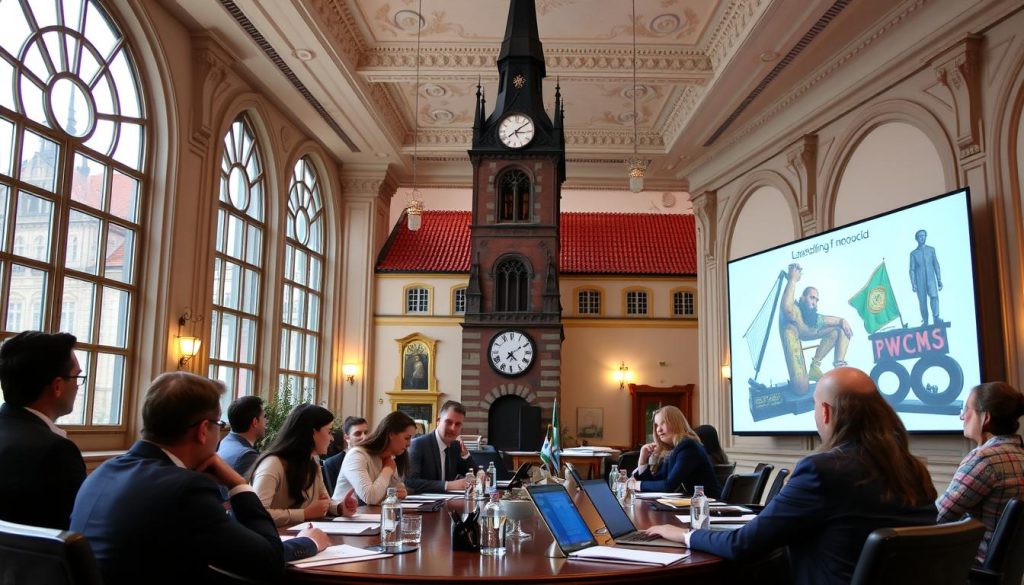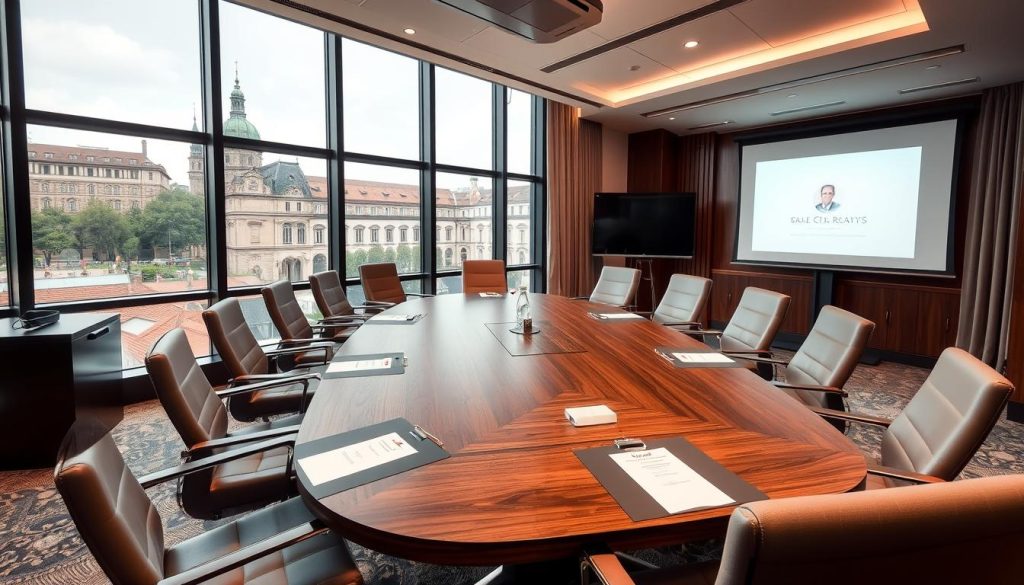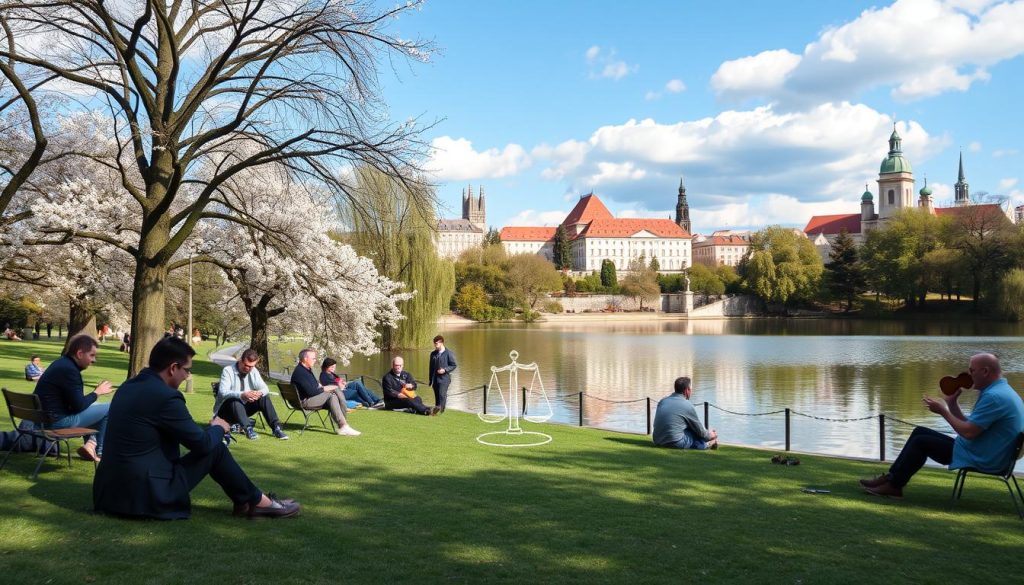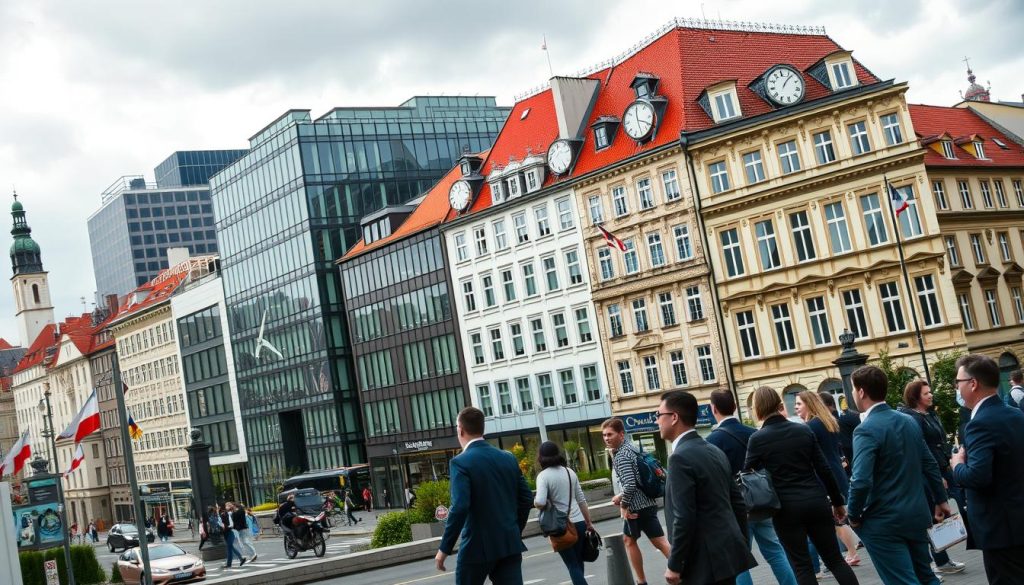In today’s globalised economy, knowing the business culture in Czech Republic is key for success. This culture is shaped by history, local traditions, and the economy. It makes Czech business practices unique.
For UK professionals looking to work in this area, learning about Czech professional etiquette is vital. It improves communication, builds strong relationships, and helps in negotiations.
Introduction to Business Culture in Czech Republic

Getting to know the business culture in the Czech Republic is key for professionals wanting to succeed here. It’s a mix of history, social norms, and economy that shapes today’s practices. Knowing this helps in building strong partnerships and understanding local challenges.
In the Czech Republic, respect and formality are big in social and work life. This shows how important it is to know how to behave properly. Being considerate helps UK professionals work well together, improving business chances.
The country’s history and move to a free market have shaped business today. Knowing these factors is vital for building trust and credibility. The next parts will explore more about what makes Czech business culture unique.
Historical Influences on Czech Business Practices

The Czech business world has been greatly influenced by its history. The country moved from a planned economy to a market-based system after the Velvet Revolution in 1989. This big change helped shape today’s business ways and views.
In the socialist times, businesses were very collectivist, limiting personal drive. This made people often see less value in competition and new ideas. Even after the change, entrepreneurs had to adjust to new markets while keeping old habits in mind.
Joining the European Union brought more changes. It opened Czech businesses to wider markets and higher standards. This move brought new resources and encouraged better business practices. Both local and international players helped make the business scene more lively.
Important events and people have greatly influenced Czech business. Václav Havel, the first President after communism, encouraged many to see entrepreneurship as a way forward. Today, these historical impacts still affect business ethics, strategies, and how people do business in the Czech Republic.
Key Characteristics of Business Culture in Czech Republic

Understanding Czech business culture is key for anyone working here. It’s all about being formal and structured. Meetings, communications, and who’s in charge show respect for order and tradition.
Formality and Structure
Being formal is a big deal in the workplace. People use titles and last names until they’re told to use first names. Meetings are planned ahead and stick to a set agenda.
Being on time is important. Showing up late is seen as rude. Everyone is expected to be well-prepared, showing respect and professionalism.
Hierarchy in the Workplace
The workplace in the Czech Republic has a clear hierarchy. Senior management makes big decisions. A top-down approach is common in many companies.
Employees must respect their bosses and follow rules. For UK professionals, knowing this hierarchy is vital. It helps build respect and teamwork, making communication better.
Communication Styles in the Czech Republic

Understanding how people communicate in the Czech Republic is key for business success. Czechs like to get straight to the point, valuing clear and honest talks. They prefer straightforward words and messages, which helps avoid confusion.
But, it’s also important to notice the subtleties in tone and context. These show the deep culture that shapes their daily conversations.
Direct vs Indirect Communication
While Czechs often prefer direct communication, there are times when indirectness is better. This balance can be seen in different ways:
- Being clear and respectful when asking for something or giving feedback.
- Understanding the unspoken meanings in conversations, as not everything is said out loud.
- Approaching sensitive topics carefully to keep things harmonious.
By using these strategies, you can better understand and connect with your colleagues.
Importance of Non-Verbal Cues
Non-verbal signals are very important in Czech communication. Things like body language, eye contact, and gestures send strong messages. Here are some key points:
- Eye contact shows you’re paying attention and respect.
- Respecting personal space is important, as it varies from person to person.
- Gestures can help support or add to what you’re saying.
Being aware of and adapting to these non-verbal cues can make your conversations more effective. This can strengthen your professional relationships in the Czech Republic.
Building Relationships in Czech Business

Building strong professional relationships is key in Czech business. Networking in Czech Republic is more than just exchanging cards. It’s about building trust and rapport with colleagues and partners. This can lead to successful collaborations that benefit everyone.
- Develop personal rapport. Casual chats help build trust and familiarity.
- Join social activities. Coffee breaks or after-work events create a sense of community.
- Be patient in building relationships. Trust grows over time, so stay consistent.
- Show genuine interest in your colleagues’ views and cultural values.
These steps help build a respectful environment. This is essential for teamwork and success in the Czech Republic.
Business Etiquette and Norms

Czech business etiquette is crucial in professional settings, especially in making introductions. Knowing how to greet and address colleagues is key to building strong business relationships in the Czech Republic. It’s important to use the right titles and be formal at first meetings.
Greetings and Introductions
A firm handshake is the norm when meeting someone for the first time. It shows you’re professional and confident. When introducing yourself, use titles and surnames to show respect. Even though first names might be okay later, start with formality.
Addressing Colleagues and Superiors
In the Czech Republic, it’s important to address colleagues correctly. Use titles like “pan” (Mr) or “paní” (Mrs) followed by their surname. This shows respect and follows the cultural norms of workplace hierarchy. As you get to know people better, you might use more casual ways to address them. But always start with respect.
Meetings and Negotiations in Czech Republic

Czech business meetings are formal and structured. It’s important to be well-prepared for these discussions. A clear agenda is key to a successful meeting, showing respect for everyone’s time.
Before meetings, gather all necessary information. Think about questions or concerns that might come up.
Approaching Formal Discussions
When you’re in a formal discussion, being respectful and professional is key. Being on time shows you respect others.
Speak clearly and concisely, sticking to facts. Active listening shows you value others’ opinions. If disagreements happen, patience helps in finding common ground.
Strategies for Successful Negotiations
Good negotiation strategies are vital for success in Czech business meetings. Knowing the local culture helps. Czechs value trust and long-term relationships.
Building rapport takes time but can lead to better results. Being patient is important, as decisions are often made slowly. Being open to different ideas can also help.
The Role of Punctuality and Time Management

In the Czech Republic, being on time is key in business. It shows respect to colleagues and partners. This shows how important time management is in Czech culture.
Meetings start right on time, and people are expected to arrive early. This shows the value of time in Czech culture. If you’re late, it can make a bad impression.
At meetings, keeping things short and focused is important. Long talks are not well-received. This is why good time management is crucial.
UK professionals can do better in Czech business by being punctual and organised. This helps avoid mistakes and builds stronger relationships.
Understanding Czech Work-Life Balance

In the Czech Republic, work-life balance is key to well-being. Many people aim for a mix of personal and work life. This is seen in how they view working hours.
Working Hours and Flexibility
Working hours in the Czech Republic are usually 8:00 AM to 4:30 PM or 5:00 PM. Companies often offer flexible schedules. This helps people manage their time well, keeping personal life in check.
Importance of Leisure Time
Leisure time is highly valued in Czech culture. After work, hobbies, family, and friends are important. This shows that work should not dominate life.
This balance boosts productivity and job happiness. It shows the value of a healthy mix of work and leisure.
Corporate Social Responsibility in Czech Business

Corporate social responsibility in the Czech Republic has grown a lot lately. Businesses now see their role in helping society and the environment. They believe CSR is key to running sustainable operations and improving their reputation.
Stakeholders want companies to do good for their communities and protect the environment. This is becoming a big part of business.
Many Czech companies are taking steps to be more responsible. They support local charities, use eco-friendly methods, and encourage volunteering. These actions boost their image and make employees happier and more loyal.
In the Czech Republic, CSR can be seen in many ways:
- Working with local groups on community projects
- Using green technologies to cut down on pollution
- Starting programs to help those who are less fortunate
By matching business goals with social values, companies can build strong relationships with their stakeholders. This approach also helps them grow in the long run. Focusing on ethics in Czech business builds trust and encourages a sense of responsibility among everyone involved.
Challenges Foreign Professionals May Encounter

Foreign professionals face many challenges when they enter the Czech business world. Cultural misunderstandings often happen because of different ways of communicating, solving conflicts, and following workplace rules. It’s crucial for newcomers to know about these potential problems.
Cultural Misunderstandings
Misunderstandings in the Czech workplace can be big hurdles for UK nationals. The way feedback is given and received can be confusing or even lead to resentment. Here are some examples:
- The need for direct communication might seem blunt to outsiders.
- Czechs often prefer quiet solutions to conflicts, not open discussions.
- Formality levels can be misinterpreted in international settings.
To tackle these issues in Czech business, foreign professionals should learn about the culture. They should also work on listening skills. Understanding these differences can greatly improve working relationships.
Gender Roles in Czech Business Environment

The Czech business world is changing, with more focus on equality. Traditionally, women were seen as less important in the workplace. But now, there’s a push for a fairer work environment for everyone.
Workplace Equality and Women’s Roles
Women are becoming more prominent in leadership roles in Czech companies. There’s a growing effort to help women advance in their careers. This includes recognizing how diversity can boost business success and creativity.
- Increased representation of women in management and decision-making roles.
- Supportive policies for maternity leave and childcare.
- Training programmes aimed at leadership skills for women.
Despite progress, old beliefs still hold back equality. It’s crucial to tackle these stereotypes to create a fairer workplace. Knowing about gender roles in Czech business helps UK professionals work better together.
Emerging Trends in Czech Business Culture

The Czech business scene is changing fast. Technology is playing a big role in this change. Companies are using digital tools to work better and come up with new ideas.
Remote work is now a big deal in Czech businesses. Many firms are adopting flexible work models. This makes employees happy and helps them work better.
Businesses are also focusing on being green. They’re adding eco-friendly steps to their work. This is because people want to buy things that are good for the planet.
Start-ups and new ideas are booming in the Czech Republic. Investors are putting money into new businesses. This creates a lively place for entrepreneurs to grow.
Workplaces are becoming more team-based and adaptable. This helps teams deal with the fast-changing market. It’s all about being ready for new challenges and keeping the spark of innovation alive.
Best Practices for UK Professionals in Czech Republic

UK professionals need to know how to work well in the Czech business world. It’s all about understanding the Czech way of doing things. By following these tips, you can improve your work life in the Czech Republic.
Adapting to Local Customs
Getting used to Czech culture means knowing and respecting their traditions. Here are some key things to do:
- Learn about the right clothes and office rules.
- Know what topics to avoid in conversations.
- Try Czech food when you’re out with colleagues.
- Use some Czech words to show you care.
Changing how you act and think shows you’re serious about fitting in. This helps a lot when working with Czechs.
Strategies for Effective Collaboration
Building strong partnerships in the Czech Republic needs patience and being open. Here are some tips:
- Listen carefully to what others say.
- Ask for feedback and include Czechs in decisions.
- Focus on building relationships first, then talk business.
- Be ready for talks to take time, as trust is key.
These tips will help UK professionals do well in the Czech business world. They make working together more effective and productive.
Conclusion: Embracing Czech Business Culture
Understanding Czech business culture is key for success in the Czech Republic. The importance of formality, hierarchy, and direct communication is huge. UK professionals need to adapt to these to build strong relationships.
Embracing Czech culture means being open-minded and valuing cultural differences. Knowing about things like punctuality and structured meetings helps a lot. This way, UK professionals can work better in the Czech market.
This article shows how important it is to learn about Czech culture. By doing so, UK professionals can start strong collaborations. Success in international business comes from respecting local culture. This leads to lasting professional relationships.

